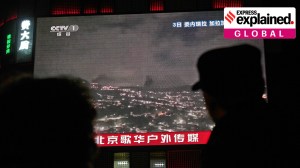The Coup And The War
Muhammad Mossadegh was born in the late 19th century to privilege in the deeply networked Persian upper class.
Why the biographies of Muhammad Mossadegh and Jim Thompson are relevant today
India is being called upon to choose its friends carefully because,dont you know,Iran is relegating itself more firmly as a global pariah,never mind that thoughtful Iranians,in the country and in exile,caution that clumsy attempts at regime change will boomerang to the detriment of the reform project. But who are we laypersons to know and assess nuclear weaponisation programmes and the grave dangers the worlds collective cop must reckon with. Lets instead look at two timely biographies of two very different men,separated in space though not in time,bound together only in the manner in which their lives shed a light on the potential dangers of interventionism.
It is near-impossible to translate into a chart the layers of power in Iran from the clerics in Qom,the politicians in Tehran,the bazaaris countrywide who know best which way the wind blows,to the entrenched interests within the Revolutionary Guards to show where authority resides,but ordinary Iranians are quick to bring up a name whenever the argument comes up that all that interventionists want is true democracy for this ancient and proud civilisation. Oh yes,they ask,then do you remember Mossadegh?
Muhammad Mossadegh was born in the late 19th century to privilege in the deeply networked Persian upper class,but built his politics around resistance to the Shahs unquestioned power and a Western stranglehold on his countrys oil wealth. His was a politics founded on constitutionalism and secularism,but when,as prime minister,he nationalised the Anglo-Iranian Oil Company now BP as a reaction to what his Iranian supporters saw as an unfavourable revenue-sharing arrangement,he set off a chain reaction that saw the British drag in the Americans to pull off a coup and restore the Shah to power.
As Christopher de Bellaigue tells it in his biography Patriot of Persia: Muhammad Mossadegh and a Very British Coup,Mossadeghs obduracy too contributed to the confrontation that eventually brought upon his downfall,but the orchestrated manner of his downfall still resonates amongst Iranians: The 1953 coup was a catastrophe which slammed him to the floor,and from which Iran never fully recovered. But Iranians are kind towards heroes who fall. It depends on the manner of the fall,because a valiant defeat against overwhelming odds at the hands of a malignant evil is regarded as victory on a higher,metaphysical plane. Hardliners in the revolutionary Iran of Khomeinis making may not care to resurrect Mossadegh to a roster of heroes,but de Bellaigue,a Briton whos a long-time resident of Tehran,reminds the reader that when she was American secretary of state,Madeleine Albright admitted that the US played a significant role in orchestrating the overthrow of Irans popular prime minister,Muhammad Mossadegh,which was a setback for Irans political development.
Jim Thompson,is known to most of us as the man who transformed the Thai silk industry and to whose old art-filled home visitors to Bangkok are taken for an authentic experience of local luxury. This waterfront house was once,in the mid-20th century,a hub for powerful and famous Americans passing through town. Thompson had first arrived in Thailand in service of the predecessor organisation of the CIA,but had drifted from direct involvement in its Southeast Asia operations to immersion in the silk trade. While American generals posted in the region would continue to seek and hear him out,Thompson became a progressively strident critic of the choices the United States was making in Vietnam,Laos and Thailand. And when hed disappear from a Malaysian hill station in 1967,with not a trace of his remains found to this day,many conspiracy theories would be launched. Was it the CIA? Was it a local bandit? Were it rivals in the silk trade or other vested interests in the region?
Each theory,taken individually,still sounds fanciful and Joshua Kurlantzick,currently affiliated with the Council on Foreign Relations in New York,is meticulous in exploring them in his biography,The Ideal Man: The Tragedy of Jim Thompson and the American Way of War. But this exploration of the mystery,and the mystique,of Thompson interrogates the American intervention in the region,and it is important to recall that US actions impacted Thailands democracy too. Writes Kurlantzick while setting up his narrative: The Indo-China war thrust Thailand into the centre of world events,but for many Americans who focused on Thailand,it also became a canvas for ideological conflict. For some American advisers who had worked with anticolonial nationalist movement in Southeast Asia during World War II,the United States could best serve the region and its own interests by maintaining alliances with the men and women fighting to free themselves from French,British,and Dutch colonial rule.
The very different life stories of Mossadegh and Thompson no doubt played out amidst American anxieties during the high noon of the Cold War,and fears about communisms more easily masked assessments of Asian assertions of nationalism. So parallels with the present are dangerous. However,the underlying call to caution in these biographies about precipitate action is not.
mini.kapoorexpressindia.com
- 01
- 02
- 03
- 04
- 05































